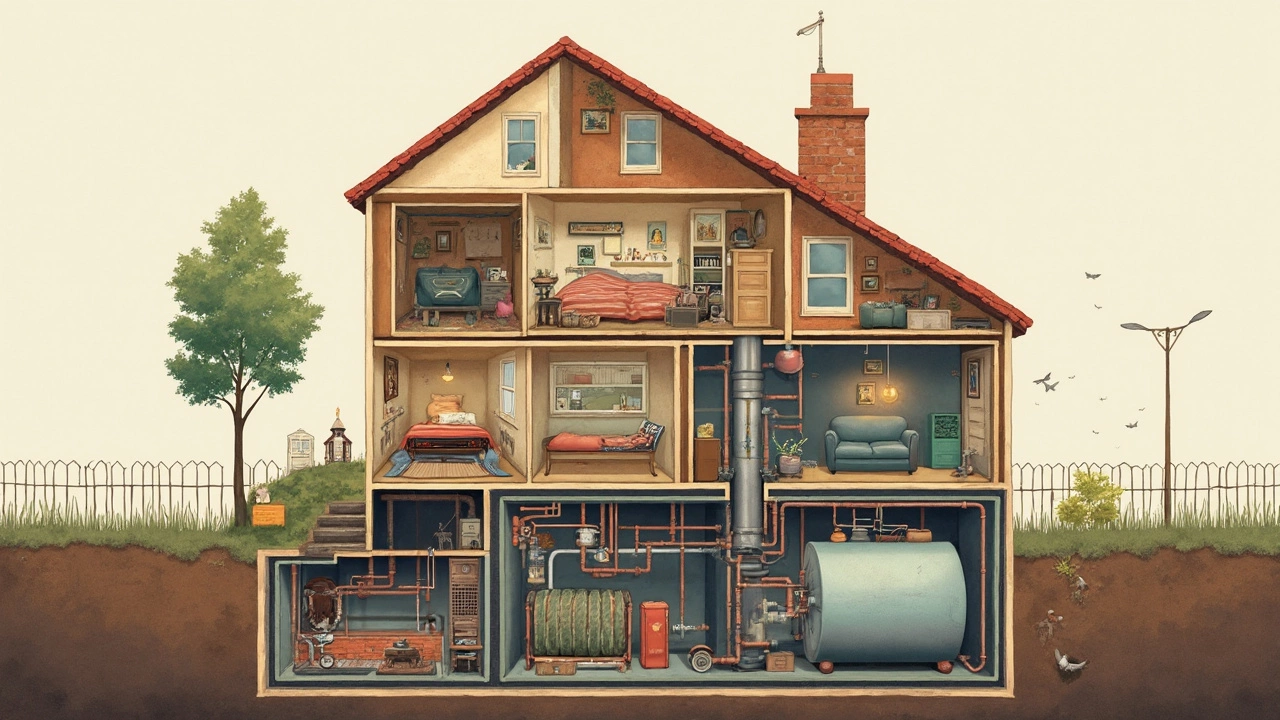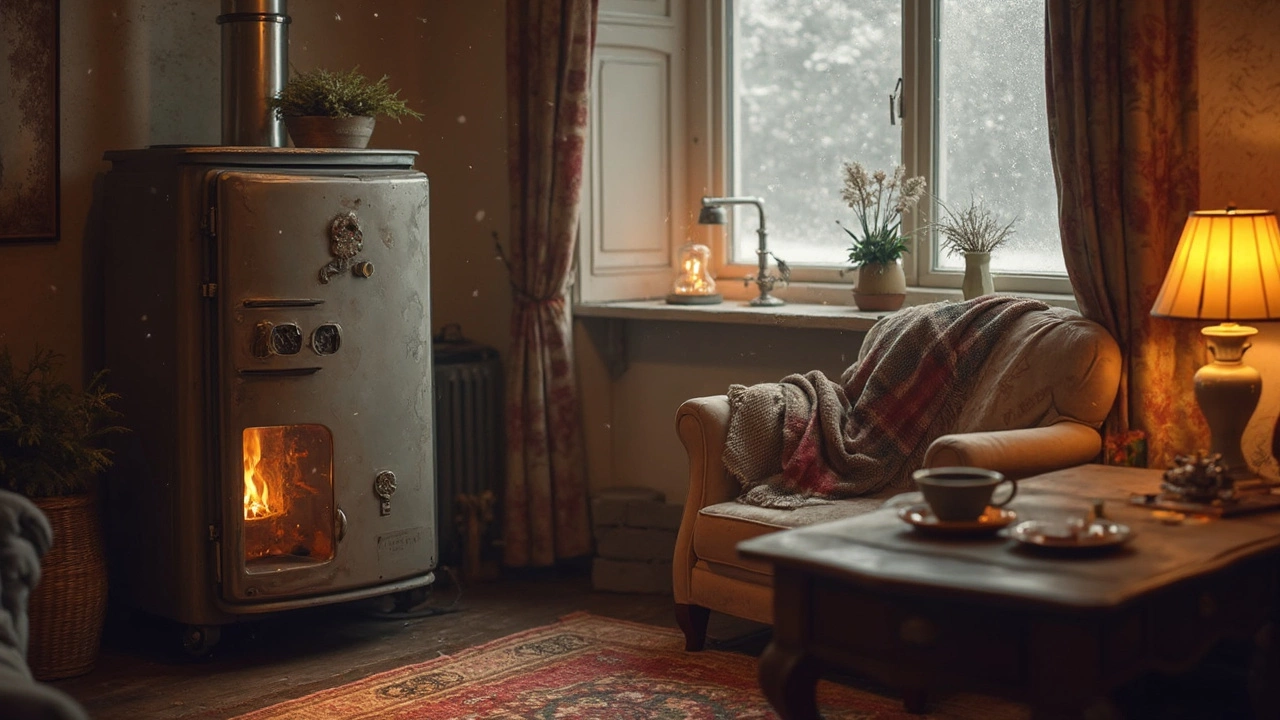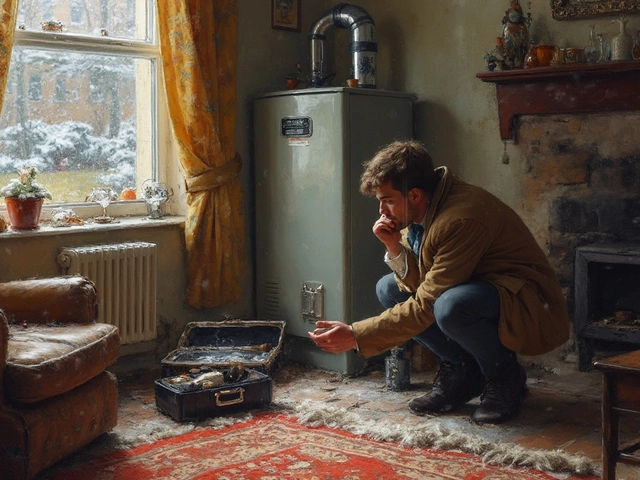Imagine your boiler as the heart of your home, busily pumping warmth through every nook and cranny. But how many years can it keep up the good work, and what happens when it falters? Most boilers are built to last around 15 to 20 years, but with careful care and a bit of luck, could they reach the ripe old age of 50?
Let's kick things off by looking at the typical lifespan of a boiler. Generally, a decent boiler would serve a solid two decades if given due attention. While there are tales of boilers hanging in there for half a century, they are definitely the rare gems.
So what spells the difference between an early retirement and the possibility of clocking 50 years? Factors like water quality, frequency of use, and regular maintenance play starring roles. A well-maintained boiler is like a trusted old car – a bit creaky, maybe, but wholly reliable.
- The Typical Lifespan of a Boiler
- Factors Influencing Boiler Longevity
- Maintenance Tips for Extended Boiler Life
- Signs It's Time for a New Boiler
The Typical Lifespan of a Boiler
Boilers might not be on the kitchen conversations list, but they quietly get the job done. Now, if you’ve ever wondered how long these machines can keep clunking along, let’s dive in. Typically, **boiler lifespan** sits at around 15 to 20 years. That’s kind of like a middle-aged spread for a boiler if you will.
According to a survey conducted by the 'Energy Saving Trust', a household energy efficiency expert, “Regularly serviced and well-maintained boilers can stretch their life expectancy to over two decades.”
A stitch in time saves nine when it comes to boilers.
Factors Affecting Boiler Lifespan
Several key factors decide if your boiler checks out early or happily steams into its silver years:
- Quality of Installation: A quality start matters. A poorly installed boiler might cut its own journey short.
- Maintenance Frequency: Like a pet who needs regular vet visits, your boiler thrives on annual check-ups. This keeps things ticking smoothly.
- Usage Levels: Think of how often your boiler works. More usage equals more wear and tear. Simple math, really.
While it’s tempting to keep an appliance running for as long as possible, efficiency does dip over time. Newer models often use energy more effectively, which could save some pennies on those annoying bills.
In a nutshell, it's entirely possible for **boilers** to achieve longer service lives with the right care. That being said, if you're nursing a vintage model, it might be wise to start thinking about replacements sooner rather than later.
Factors Influencing Boiler Longevity
Ever wondered what keeps your boiler lifespan ticking? The truth is, several key factors can make or break how long your trusty heat-maker lasts. Paying attention to these can not only save you money but also keep those chilly nights cozy for longer.
1. Regular Maintenance
Just like a car, a boiler needs regular check-ups to ensure it's in top shape. Miss out on those yearly services, and you might be cutting its life shorter than expected. A heating expert once said,
"Routine maintenance extends the operational lifespan by 30%," according to Ian Smith, a veteran boiler technician.
2. Water Quality
Hard water can be a silent boiler killer. Excess minerals lead to lime scale, which clogs pipes and forces the boiler to overwork. Water softeners or conditioner treatments can be the hero of this story, preserving your boiler's health.
3. Usage Patterns
How often you use your boiler matters too. Constant use will wear it down faster. Those living in colder climates might find their boilers aging a bit quicker compared to folks in milder areas.
4. Installation Quality
Starting off on the right foot is crucial. A poorly installed boiler is bad news right out of the gate. Always hire a certified technician for installation to sidestep future headaches.
| Factor | Impact on Longevity |
|---|---|
| Maintenance | Extends by 30% |
| Water Quality | High impact with hard water |
| Usage Patterns | Higher usage decreases lifespan |
| Installation Quality | Critical from the start |
With these factors in mind, it's all about smart care and attention. Cheating the odds and hitting that 50-year mark might just be possible if you play your cards right.

Maintenance Tips for Extended Boiler Life
Keeping your boiler in tip-top condition isn't just for peace of mind; it's also the key to stretching its lifespan. Regular maintenance can remarkably boost your boiler's chances of hitting that impressive 50-year mark.
Regular Servicing
Much like taking your car in for an MOT, booking an annual boiler service is essential. A professional can spot and fix minor issues before they turn into costly troubles. Plus, it's the best way to ensure your boiler is running safely and efficiently.
Bleed Your Radiators
If your radiators aren't heating up evenly, it might be time to bleed them. This simple DIY task releases trapped air and helps your boiler run smoother, extending its life. All you need is a radiator key and a cloth.
Check Pressure Levels
Your boiler's pressure gauge is the window to its health. Ideally, it should hover between 1 and 2 bars. Anything outside this range can strain your boiler. It's easy to adjust, but call a professional if you're unsure.
Keep an Eye on the Flame
A healthy boiler flame should be a strong, clear blue. If it's yellow or smoky, it needs attention right away. This could mean your boiler isn't burning fuel efficiently or safely.
Insulate Pipes
Winter can be a harsh critic. In freezing temps, unprotected pipes could freeze, causing blockage. Pipe lagging is an affordable solution that helps keep your system cozy during the chill.
Following these boiler maintenance tips can give your system a fighting chance against time. A bit of TLC goes a long way in keeping it in the game, so don't skip these steps.
Signs It's Time for a New Boiler
Spotting when your boiler's considering early retirement isn't always straightforward, but there are some telltale signs it's contemplating the big shutdown. Let’s face it, nobody wants to be left in the cold by a worn-out boiler.
Strange Noises
If your boiler starts sounding like a heavy metal concert, it's trying to tell you something. Banging, clunking, or whistling noises often mean trouble. These sounds can signal issues with the pump, air in the system, or low pressure.
Escalating Energy Bills
Notice your energy bills creeping up? An old, inefficient boiler might be to blame. Older systems tend to lose efficiency over time, causing energy costs to spiral. If your once trusty boiler is guzzling more energy than necessary, it might be time for a replacement.
Frequent Breakdowns
When your boiler becomes a regular at the repair shop, the costs can add up quickly. Continual fixes aren't just lightening your wallet; they're a strong clue that your boiler is past its prime.
Yellow Flame
A boiler should burn with a bright blue flame. A yellow or orange one may indicate carbon monoxide presence, a dangerous, colorless gas. In this case, safety first – call in a pro to check it out immediately.
Age Is Just a Number - Until It's Not
While some boilers can defy the odds, as we mentioned earlier, most are designed to last around 15 to 20 years. If yours is hitting the upper end of this range, getting a newer model might save you from unexpected disruptions.
"Regular maintenance is crucial for a boiler's health, but knowing when replacement is the best option can save homeowners from safety risks and financial strains," says Harry Norman, a seasoned HVAC expert.
- Unusual sounds
- Rising energy bills
- More frequent breakdowns
- Discolored flame
- Advanced age
By replacing an old boiler, you're not just planning for uninterrupted warmth, but also ensuring a safer and more energy-efficient home.




